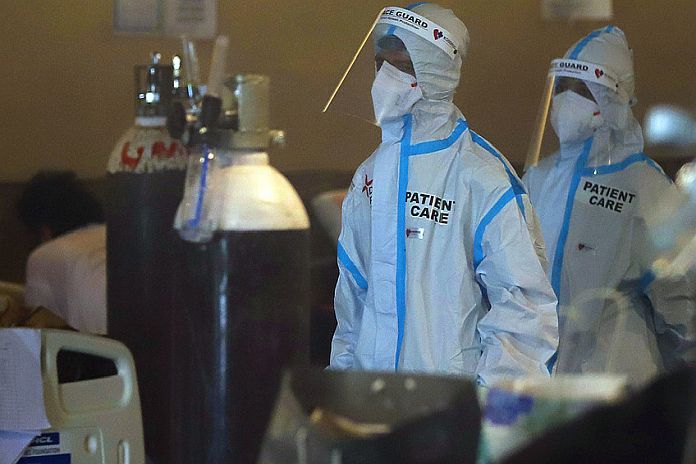GENEVA, Switzerland – Cases and deaths resulting from COVID-19 continue to climb worldwide, mostly fuelled by the highly transmissible Delta variant, which has spread to 132 countries, said the head of the World Health Organization (WHO) on Friday.
Almost 4 million cases worldwide were reported last week to WHO and the agency expects the total number of cases to pass 200 million, in the next two weeks. “And we know this is an underestimate”, underscored Director-General Tedros Adhanom Gebreyesus during his regular COVID-19 briefing.
Infections have increased in every region of the world, with some even reaching 80 percent more in the past month. In Africa, deaths have increased by 80 percent over the same period, the official warned.
Overwhelmed
Tedros blamed the rise of cases on increased social mixing and mobility, the inconsistent use of public health and social measures, and inequitable vaccine use. He said “hard-won gains” are in jeopardy or being lost, and health systems in many countries are increasingly overwhelmed.
“WHO has warned that the COVID-19 virus has been changing since it was first reported, and it continues to change. So far, four variants of concern have emerged, and there will be more as long as the virus continues to spread”, he underscored.
A higher viral load
Lead WHO epidemiologist and COVID-19 technical lead, Dr Maria Van Kerkhove, explained that the Delta variant has certain mutations that allow the virus to adhere to human cells more easily and that experts are also seeing a higher viral load in individuals infected.
She called Delta “dangerous and the most transmissible SARS-CoV-2 virus to date”.
“There are some laboratory studies that suggest that there’s increase replication in some of the modelled human airway systems”, she added.
In terms of severity, Dr Van Kerkhove highlighted that there has been an increase in hospitalizations in certain countries affected by the variant, “but we haven’t yet seen an increase in mortality”.
The WHO expert reminded that although there is some data that suggest that people vaccinated can get infected and transmit the variant, the likelihood is much reduced after the second dose has been administered and reached full effectiveness.
She also clarified that Delta is not specifically targeting children as some reports have suggested, but warned that as long as the variants are circulating, they will infect anybody that is not taking proper precautions.
Continuing to evolve
“It’s in the virus’s interests to evolve, viruses are not alive they don’t have a brain to think through this, but they become more fit the more they circulate, so the virus will likely become even more transmissible because this is what viruses do, they evolve they change overtime”, Dr Van Kerkhove warned, echoing Tedros’ remarks.
“We have to do what we can to drive it down”, she added, reminding that public health and social measures do work against the Delta variant, and that the vaccines do prevent disease and death.
Dr Michael Ryan, executive director of WHO health emergencies, said that even with the virus getting “faster and fitter” the gameplan does not change, but It needs to be implemented more efficiently.
“Delta is a warning that this virus is evolving, but it is also a call to action before more dangerous variants emerge”, he said.
Shots for Africa
Last month, the WHO chief announced the setting up of a technology transfer hub for mRNA vaccines In South Africa as part of WHO’s efforts to scale up production of vaccines and their distribution in Africa.
“Today we have taken another step forward, with a letter of intent that sets out the terms of collaboration signed by the partners in the hub: WHO; the Medicines Patent Pool; Afrigen Biologics; the Biologicals and Vaccines Institute of Southern Africa; the South African Medical Research Council and the Africa Centres for Disease Control and Prevention”, Tedros explained.
He added that WHO’s goal remains to aid every country in vaccinating at least 10 percent of its population by the end of September, at least 40 percent by the end of this year, and 70 percent by the middle of next year.
“We are a long way off achieving those targets. So far, just over half of countries have fully vaccinated 10 percent of their population, less than a quarter of countries have vaccinated 40 percent, and only three countries have vaccinated 70 percent”, Tedros warned.
The WHO head reminded that the global distribution of vaccines remains unjust, despite expert warnings and appeals, and said that all regions remain at risk, “none more so, than Africa”.
“On current trends, nearly 70 percent of African countries will not reach the 10 percent vaccination target by the end of September”, he cautioned.
New tool to fight Delta
Tedros also announced that on response to the Delta surge, the WHO’s Access to COVID-19 Tools Accelerator is launching the Rapid ACT-Accelerator Delta Response, or RADAR, and issuing an urgent call for US$ 7.7 billion for tests, treatments and vaccines.





